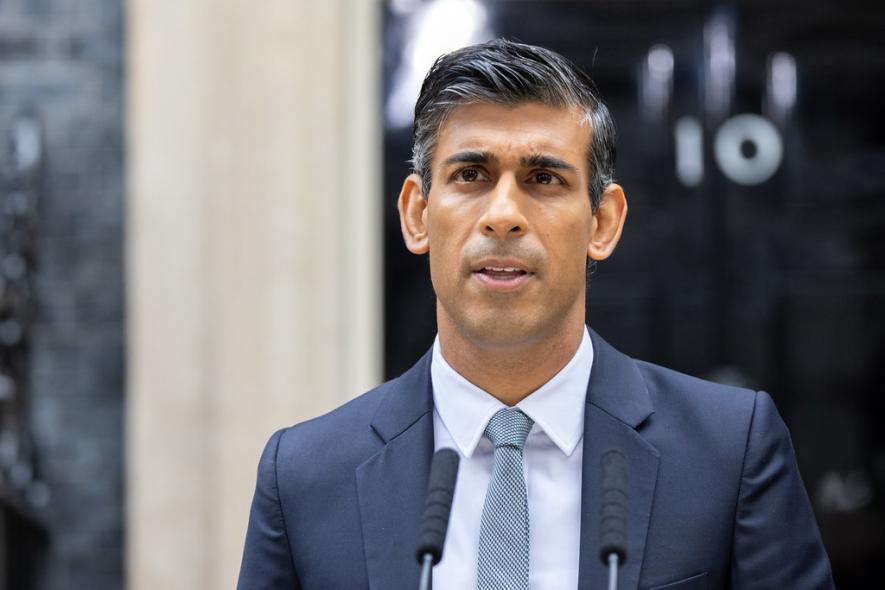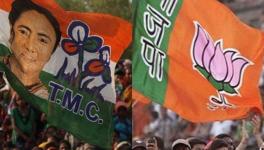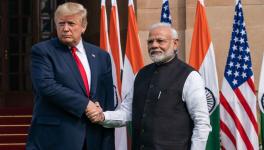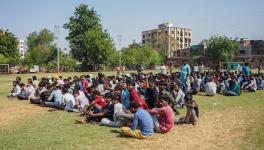Despite Rishi Sunak, Western Liberal View on Race and Class Hasn’t Changed

Rishi Sunak. Image Courtesy: Flickr
Two recent events in Europe open a unique window to the place of race and class in the west after nearly four decades of the neo-liberal order. One is the elevation of Rishi Sunak as Prime Minister of Britain, which understandably received much media attention in India and the world. That a person from a religious and ethnic minority, whose ancestors were colonised three generations ago, gets one of the most critical positions in the west is undoubtedly significant. Those of a liberal persuasion saw in it proof of the robust openness of Western liberal society and its institutional commitment to fair play.
The second event was on 13 October, an address by Josep Borrell, the foreign policy chief of the European Union, at the inauguration of the European Diplomatic Academy. The highest European official responsible for shaping its relationship with the world spoke of a nice us versus them binary which even a child can understand. Part of his speech went like this: “Europe is a garden. The rest of the world is a jungle… And the jungle would invade the garden. Gardeners should take care of it. But they will not protect the garden by building walls around it… because the jungle has a strong growth capacity… the walls will never be high enough to protect the garden… The gardeners have to go to the jungle… otherwise, the rest of the world will invade us….”
Borrell’s speech carries many tropes that formed Europeans’ self-perception during their mission of colonising the world. A primary difference in the 21st century is he warns of Europe being invaded, not going out to conquer and ‘civilise’ others. Indeed, the imagery of a dreadful jungle swarming a well-kept, neat garden is an attempt to capture the recent visuals of desperate migrants from the Middle East and Africa in dingy boats trying to enter Europe. Anti-immigrant politics is the staple of the extreme right in Europe. Parties with fascist antecedents have gained phenomenally in the recent elections in Sweden, Italy, Germany, and Austria, precisely on anti-immigrant platforms. If racists and nativists in Europe see the rise of an ‘outsider’ in Britain as a sign of bad times, they would wholeheartedly agree with Borrell.
All complex and heterogeneous societies have contradictory aspects. It is tempting to see these events—the first showing Western liberal societies allowing an ex-colonised to enter and flourish, and the second how much they despise migrants, as two facets of heterogeneity. However, more telling aspects lurk beneath the surface. Borrell is from the Socialist Party of Spain, a mainstream party as any in contemporary Europe. On the other hand, Rishi Sunak’s government is as anti-immigrant as any in Britain’s recent history. One of its pet projects is a programme to send illegal immigrants from Britain to Rwanda in Central Africa, for which it would pay the Rwandan government to keep them in detention camps. Progressive South Asian groups in Britain warn of increased racism under Sunak’s government.
Sunak and Borrell, very successful in mainstream European politics, are not so different after all, despite very different cultural and ancestral backgrounds. The source of their similarities lies in certain core pillars of Western liberal politics: an ideological commitment bordering on fanaticism to the exceptional character of the west vis-a-vis the world, its position in the imperial world order, and a whole-hearted acceptance of neoliberalism in the political economy. The acceptance of Sunak as prime minister, and Borrell’s racist rant, only appear different as they arise from distinct entanglements of race and class at the two opposite poles of class hierarchy in Western society. These poles result from how globalisation and the neo-liberal order are playing at either end of the class. So, what we have is a structured and layered reality. What happens and is seen at one layer may be very different from deeper processes in other layers.
Effects of Globalisation on Rulers and Masses
We should be careful not to paint the entirety of Western liberal politics with the same brush as people like Borrell do to the non-Western world. British politics has historically been more accommodating of people from minority racial, ethnic, national and religious backgrounds than other countries of the west. Dadabhai Naoroji, the grand old man of Indian nationalism, was elected to the British parliament on the Liberal Party ticket in 1891, the heyday of the Victorian era at the height of the British colonial empire. Another person of Indian origin, SP Sinha, was a peer in the House of Lords in 1919. One of two Communists first elected to the British Parliament in 1923 was Shapurji Baklatvala, an Indian who won from a South London seat. Rajani Palme Dutt, a doyen of the British Communist Party, had an Indian father and a Swedish mother. In the current House of Commons, about 8% of elected MPs are from ethnic minorities, many from white-majority mixed constituencies. So, it is not difficult to imagine a person like Sunak as the British prime minister.
On the other hand, it is nearly impossible to imagine a citizen of Algerian descent in the republic of France or of Turkish background in Germany getting to the top executive post. There are differences between politics in different Western countries. There are also significant common trends.
While the successful British politicians of immigrant Indian backgrounds in earlier generations were mainly from the Left, the current generation of prominent politicians from minority backgrounds—like British Indians Sunak, Priti Patel and Suella Braverman, Kwasi Kwarteng (a British Ghanian), and Sajid Javid (British Pakistani)—made their mark in the right-wing Conservative Party. This is related to the changing internal configuration of the richer strata of society following the globalisation of imperial capital.
Globalisation has helped a technocratic elite fill the managerial roles in capital’s empire. One aspect of the liberal character of current capitalism and imperialism is their willingness to spread the recruitment net to technocratic managerial positions internally and globally, including societies at the periphery. This validates the internal meritocratic ideology of technocratic elites and makes practical sense. Provided that training and managerial practices are sufficiently homogenised, recruitment from diverse individual backgrounds stabilises the system and grants it public legitimacy. This has created a global flow of personnel and exposure to diverse cultural backgrounds.
Sociologically, recruited professionals get integrated into the wealthiest strata of society, affecting the ruling classes’ cultural discourse. This should be distinguished from the condition after World War II, when many people from the former colonies migrated to Europe. However, they were recruited into lower-paying manufacturing jobs. The ruling class culture was little affected. Sunak’s Hindu-Indian background is no big deal today. With his erstwhile position within London City-based finance capital, he just happened to be the right person at the right time for a spot in British politics. Besides, it happened when finance capital went on a strike against his predecessor Liz Truss’s populist state budget.
If globalisation has fostered cultural exposure and accommodation among the ruling strata of metropolitan countries, its effects on the working people of the world have been very different. The global domination of the finance and neo-liberal political economy has destabilised many countries of the Global South by disrupting their channels of domestic economic reproduction. Other societies, like the former Yugoslavia, Libya, Syria, and Afghanistan, have been destroyed by Western military attacks, which created many internal refugees. The youth, the most productive segment of these populations, have been joining the footloose global workforce, which gravitates towards the west.
We can best understand the social condition of the current migrant workers to the west in contrast to the state of the post-World War II migrants. The latter was absorbed in the organised and often unionised sectors. Even if they were among the lowest paid, they could visualise a ‘regular’ life in the west. The current migrants are joining a fragmented and unorganised labour force living with extreme precarity. There is little chance they will get to ‘regular’ life in the west. Their peripheral location in host societies makes them easily identifiable targets of the populist right wing.
Neo-liberal Class Rule
Yet the domestic working class has not done much better either. The two prongs of neo-liberal political economy—deregulation of labour markets and State-led austerity—have fragmented and disempowered this class. While worker productivity has increased, working conditions are less secure, and wages are stagnant. The ever-looming threat of unemployment, an uncertain future and the cost of living crisis due to unprecedented inflation have created mass restlessness and despair in 2022.
The capitalist class has rarely had such a thorough hold over State power. The precipitous fall of Truss and the consequent rise of Sunak are only episodic proofs of this control. Deeper and more structured control exists through monetary and fiscal policies. Four decades of neo-liberalism show up in a simple fact: the rule of class power from the top is naked, but there is little class politics to counter it from below.
This is creating space for the spread of the extreme right, openly using racist tropes against migrant workers and nativist calls for social and national ‘purity’. This politics is greatly helped by the long history of imperialism, which fractures the world into core and periphery, creating popular ideologies with exceptionalism at their core. The frame of the west as this “beautiful garden surrounded by a dangerous jungle” has been filled with different ideas at different times, from good-hearted philanthropist to downright racist. Borrell spoke of functioning Western institutions that deliver order and democracy, but this is how liberal governance views itself. The populist right wing emphasises racism, nationalism and ethnic differences. The ideological structure of a good us versus not-so-good or bad them remains the same.
Class and Race in Two-Front Identity Politics
All politics beyond personal gain is driven by social identities, which create imagined communities and energise human agency. The premise of even universal revolutionary working class politics (‘Workers of the World, Unite!’) rests on working people identifying themselves as a universally exploited class. Hence, any politics has a kernel of identity. Its character is determined by the relationship of this identity with others and how it articulates structural features of society, such as economy, race, class, caste, and gender.
Sunak, or Barack Obama in the United States before him, showed inclusive identity politics emerge within Western liberal societies in the globalised era. It is easy to contrast with the nativist, racist and exclusive identity politics of Borrell or Trump. However, the relationship between these two identity politics with class is more interesting. Both consciously eschew the articulation of any specific class interest. The identity politics of the affluent strata internally consolidate the ruling class while anti-immigrant populist right-wing politics fragment working people—including migrant workers.
The politics of race works differently at the two poles of class. Nevertheless, in both places, it serves the interests of the capitalist class in the neo-liberal order. Both class-blind liberal anti-racism and a naïve class politics that lacks appreciation of race and imperialism in shaping popular Western subjectivities miss this sinister tango of race and class in the service of capital.
Sanjay Kumar teaches Physics at St Stephen’s College, Delhi. Views expressed are personal.
Get the latest reports & analysis with people's perspective on Protests, movements & deep analytical videos, discussions of the current affairs in your Telegram app. Subscribe to NewsClick's Telegram channel & get Real-Time updates on stories, as they get published on our website.
























